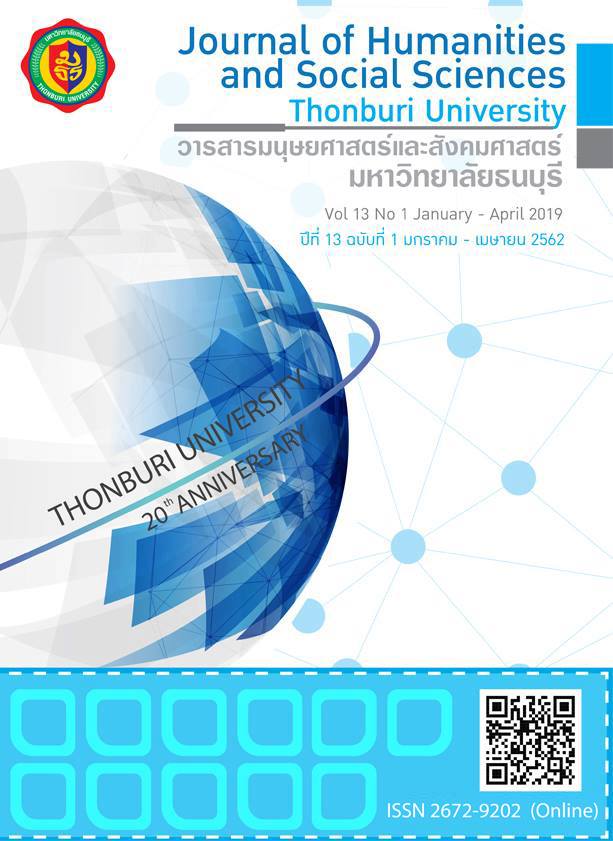การพัฒนาระบบโปรแกรมทางเลือกพัฒนาครูไทยโดยใช้ภาษาอังกฤษเป็นสื่อการเรียนการสอน
คำสำคัญ:
English as a Medium of Instruction, English for Integrated Studies, Non-English Speaking Teachers, On the Job Training, Thailand 4.0บทคัดย่อ
บทคัดย่อ
ภาษาอังกฤษเพื่อการศึกษาบูรณาการ (EIS) ได้รับการยอมรับเสมือนเป็นวัตกรรมหนึ่งในการพัฒนาครูที่ไม่เคยพูดภาษาอังกฤษ ให้ใช้ภาษาอังกฤษเป็นสื่อการสอน (EMI) ในหลักสูตรการศึกษาขั้นพื้นฐานของไทยเพื่อให้นักเรียนทุกคนมีโอกาสเข้าถึงโครงการภาคภาษาอังกฤษ (EP) ของกระทรวงศึกษาได้ ซึ่งวัตถุประสงค์ของการศึกษาวิจัยนี้ ต้องการสำรวจ ประเด็นและปัญหาของสถานศึกษาที่ใช้ EMI เพื่อนำมาพัฒนาให้เป็นระบบทางเลือกหนึ่งของการใช้ EMI สำหรับครูไทยที่ส่งผลต่อประสิทธิภาพของระบบดังกล่าว โดยทำการศึกษาวิจัยเชิงคุณภาพเชิงปรากฎการณ์ จากการเลือกผู้ให้ข้อมูลสำคัญที่ดำเนินการและ/หรือสอนโครงการ EP และ/หรือ EISในระดับมัธยมศึกษาและอาชีวศึกษา จำนวน 266 โรงทั่วประเทศไทย
ผลการศึกษาวิจัยพบว่า คุณประโยชน์ที่เกิดขึ้นจากดำเนินการโครงการ EIS ส่งผลต่อการแก้ปัญหาอย่างดียิ่งต่อโครงการ EP ซึ่งต้องอาศัยการจ้างครูต่างชาติที่มีการเปลี่ยนบ่อย ค่าลงทะเบียนและค่าเล่าเรียนสูงเกินไปสำหรับครอบครัวส่วนใหญ่ และนโยบายรัฐบาลเองไม่สามารถสนับสนุนและดำเนินการให้เกิดประสิทธิภาพในการจัดการเรียนการสอนเพื่อเปิดโอกาสให้ผู้เรียนทุกคนได้เรียน EP อย่างมีคุณภาพได้ แนวทางการพัฒนานวัตกรรม EIS จึงเป็นระบบทางเลือกหนึ่งของการใช้ EMI สำหรับครูไทยที่ไม่เคยพูดภาษาอังกฤษ (NESTs) ซึ่งองค์ประกอบสำคัญในกระบวนการของระบบนี้ ผู้บริหารสถานศึกษาเป็นผู้นำนโยบายและขับเคลื่อน EIS ผ่านกระบวนการจัดการเรียนรู้ด้วยศิลปการสอนรูปแบบ EIS 6 Tips อย่างต่อเนื่อง นอกจากยกระดับคุณภาพหลักสูตรการศึกษาภาคปกติของกระทรวงศึกษาธิการแล้วยังช่วยลดช่องว่างในระบบคุณภาพของการจัดการศึกษาและเสริมสมรรถนะการแข่งขันตามยุทธศาสตร์ชาติอีกด้วย
เอกสารอ้างอิง
Bruner, J. S. (1966). Toward a theory of instruction. Cambridge, MA: Belkapp Press.
Kolb, D. A. (2014). Experiential learning: Experience as the source of learning and development 2nded. Upper Saddle River, NJ: Prentice Hall.
Krashen, S. (1987). Principles and practice in second language acquisition. Oxford: Pergamon Press.
Knowles, M. S., Holton, E. F., & Swanson, R. A. (2005). The adult learner: The definitive classic in adult education and human resources development (5th ed.). Woburn, MA: Butterworth-Heinemann.
Matthayomwatnairong High School [MRS]. (2016b). MRS 2016 raising its educational management level to the top ten, letting Thailand escape the Middle Income Trap (MIT) with DCT. Mathayomwatnairong Journal, 19 (1), 4-6.
Matthayomwatnairong High School [MRS]. (2017b). The school’s strategies to excellence in learning and teaching during academic years 2011-2017. Mathayomwatnairong Journal, 20 (1), 3-8.
McKinsey & Company. (2007). How the world’s best-performing schools come out on top. Retrieved from https://www. mckinsey.com/industries/social-sector/our-insights/how-the-worlds-best-performing-school-systems-come-out-on-top
Ngamsom, S. (2009). The EIS training manual for non-English speaking teachers. Retrieved October, 14, 2017. from https://sites.google.com/site/eistrainingth/
Ngamsom, S. (2011). The effectiveness of bilingual education in the basic education curriculum; English for integrated studies (EIS) model. In The 3rd Malaysia-Thailand Joint Educational Research Conference, 2011 (pp. 455-483). Kementerian Pelajaran Malaysia.
Office of the National Education Commission [ONEC]. (2015). New dimension education move forwards Thailand. Bangkok: Office of the Education Council.
Peansara, W., and other (2013). Bilingual teachers development model in the pilot project of English for integrated studies (EIS). Bangkok: MOE. Retrieved July,28, 2017. from: https://sites.google.com/a/eisth.org/eisth/nbs-sth-3
PRD-Thailand, (2017). Thailand 4.0 Focuses on Area-Based Development Policy. Retrieved Oct,14,2017. from http://thailand.prd.go.th/1700/ewt/thailand/ewt_news.php?nid=5175
Schleicher, A. (2015). Schools for 21st-century learners: Strong leaders, confident teachers, innovative approaches. Paris: OECD.
Senachit,T, Trakulmututa, J. (2017). An Implementation of Teaching English Program (Mini English Program:MEP): A Case Study of Primary Education Service Area Office Songkhla Province. Journal of Thonburi University. 11(24): (pp.74-80).
The Wallace Foundation. (2013). The school principal as leader: Guiding schools to better teaching and learning. New York, NY: The Wallace Foundation.
Tubsree, C. (2005). Instructional system design. Chonburi: Faculty of Education,Burapha University.
United Nation Development Program [UNDP]. (2007). Thailand human development report 2007: Sufficiency economy and human development. Bangkok: UNDP.
Upper Secondary Education Bureau [USEB]. (2009). Manual script NT & O-Net comparison report of Upper Secondary Education Bureau (USEB). Bangkok: OBEC.
Vygotsky, L. S. (1978). Mind in society: The development of higher psychological processes. Cambridge, MA: Harvard University Press.







